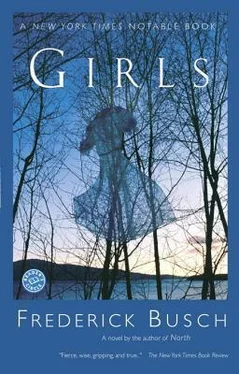I looked at Piri. She looked at me and colored. She shrugged. “My father’s a cop,” she said. “He’s a New York cop. I learned the preferences of the Police Benevolent Association before I learned to read. You always talk to the local man.”
“I’m the local man,” I said.
She said, “I know. That’s why you’re here.”
“Thanks,” I said. “Maybe. Somebody vandalized — what, defaced the book?”
“No,” Horstmuller said. Her face was full and stern and tan, her long hair wound in a knot. She wore a necklace with red stones in a silver setting, and she was conscious of it, adjusting it while she spoke. “We don’t get hysterical about damaged books. We get angry and sad, but we don’t call for security over that.”
“Sorry,” I said.
“There’s a threat,” Gombricz said.
Piri said, maybe noticing Horstmuller’s necklace, touching her own bare neck with the yoke of her small left hand, “You know about the Veep?”
I shook my head. I thought they were talking about a book or an author or a computer program.
“The Vice President,” she said.
“He’s coming to talk. In the chapel. We’ve been working with the Secret Service.”
“You will be plenty more, I guess,” Piri said, smiling. Her mouth was remarkably broad and kind of curly. “This book has some writing in the back.”
She made a flexible, bending gesture with her wrist. In the hum of the fluorescent lights on the ceiling, squinting against the glare of the bright February sky coming in the office’s two large windows, I examined the book. It was called Indispensable Superfluity: A History of the Vice Presidency in the United States. A piece of gummed memorandum paper led me to open to the back cover, and on what Piri referred to as an endpaper, I read:
The veep will weep
And then he’ll sleep
He’ll never wake up
Till called by St. Pete.
I said, “Would that be considered a legitimate rhyme?”
Piri laughed. Gombricz frowned. Horstmuller said, pretending that I wasn’t a thorough pain in the ass, but talking like I was mildly retarded, “I believe the ‘Pete/sleep’ would be called slant rhyme. But of course we’re concerned about the threat.”
I said, “You consider this a threat? ”
She said, “Yes, I consider it a threat. He’s predicting the death of a Vice President in a book borrowed from the library of a college that the Vice President is going to visit. I telephoned the Secret Service. I faxed them a photocopy, and I can tell you that they consider it a threat. They arrive this afternoon.”
“I can’t believe they’re at work this early,” I said.
“My call was relayed to the office in New York City. They had someone at a night desk.”
“Good operation,” I said.
Piri, the cop’s daughter, nodded.
“So,” I said to her, “you found this?”
“I had the book out, and I noticed the little poem. I called Irene here”—the head librarian looked at me with very large light blue eyes—“and she set things in motion.”
“So now we’re in motion,” I said. “Where are we going?”
Professor Piri said, “I guess you’ll want to be here when the Secret Service arrives.”
“I can get Elmo St. John — he’s the local cop. He and I can have the person waiting for them. Look up who had this book out before the professor and we can go get him. It’s someone either on the faculty or administration or in town, right?”
Gombricz, who had very little hair on top of his slender head but who wore a very carefully trimmed fringe of beard that followed the lines of his manly jaw, folded his hands and said in a deep and resonant voice, “Not doable.”
I thought I ought to forgive the “doable” once. I’d have bet he sang in a community choir. He probably took the starring roles when the little civic theater association did musicals. I looked at him so he would understand the need to explain. He waited, though, to make me ask.
I dutifully said, “Why?”
“Federal statutes passed, after extensive lobbying by the ALA, and subscribed to by the CLA, dictate that a library cannot disclose, without violating the constitutional right to privacy, who has taken out what book. Period.”
Horstmuller nodded. I waited until Piri nodded, and then I believed it.
“Jesus,” I said. “So we know who this person is.”
Horstmuller nodded. “We can know,” she said.
“And we can’t tell the Secret Service?”
“And we won’t,” Gombricz sang.
“And the Vice President’s life, you figure, is in danger. What if it was the President?”
“The same scenario,” Horstmuller said.
“Does the Secret Service buy this?”
Horstmuller said, “It doesn’t matter if they don’t.”
“It’s probably a crank. A prank. Whatever that is. It probably isn’t true.”
Piri smiled and shrugged. Horstmuller gave no opinion. Gombricz chanted, “We’ve no way of knowing.”
“It isn’t your field,” I said. “Okay. It isn’t mine, either. I’ll come over when the federales get here, if you like. I can pistol-whip them when they start abusing you, which I imagine they will.”
“I didn’t know campus security carried guns,” Gombricz said.
“Maybe I’ll let you touch my pistol,” I told him. Piri, grinning, ducked her head. Horstmuller pretended not to have heard. “Call me when they kick in the door,” I said. I left then because I knew I wouldn’t have a better exit line in a week of being clever.
As I drove the campus, I tried to imagine the long white chapel and its hard benches occupied by students, some there because they were interested, the majority of them driven in by their history and political science teachers. Rosalie Piri would be there, I thought. She was a woman who showed respect when she felt it. And I thought of the Vice President’s attractive face and less appealing voice, and the nervous Secret Service men in front of the podium as he leaned into the lectern and kept leaning, slumping over it and falling forward on top of it, the report disappearing into the plain high ceiling of the old Baptist church.
It would be a pity, I thought, performing the literary criticism in which I’d been trained on this very campus, to lose a good Vice President to a poem as bad as the one in the back of that book.

I drove through the parking lot behind the humanities building and I ticketed some cars. One of them wouldn’t turn over, and after I wrote the student a ticket, he asked me for a jump start. It was one of the services they required us to give, so I helped him roll it away from the building he’d nosed against, and then I connected the cables. I signaled him to crank it, he did, his engine started, and, as I removed the cables and carried them back to the Jeep, he honked his horn. I looked over and saw him tearing the ticket into halves, then quarters, and throwing them over his shoulder into the back of his car. It was when I looked at the back of his car that I came away from the Jeep, the cables still in my hands. I pointed at him as if drawing a bead, and I said, “You wait.”
He was puzzled, and perhaps frightened. They always are when you act like they aren’t quite as far beyond your reach as they think their money takes them. I went over, but not to his window. I wanted the window behind it.
I said, “Stay.”
I leaned on the roof and read the poster. It was light blue, maybe a kind of lavender. It said REWARD OFFERED, and under it was a photograph, but not of Janice Tanner. This was a smaller girl. She was nine years old, the poster said. Under her photograph were the words In Jeopardy. It didn’t tell how a child that small could be allowed to get there. It described her, height and weight and clothing she’d last been in, and it said Please Help Us.
Читать дальше











